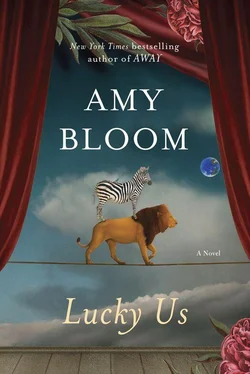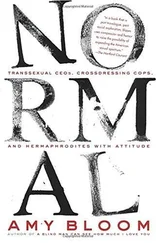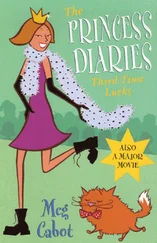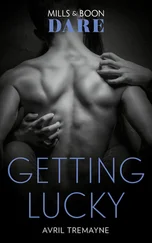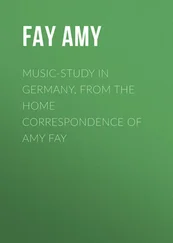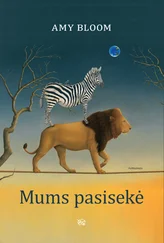WHEN DANNY IS A teenager, and Ruthie has moved hundreds of miles away, he will find himself, with new friends in darkened movie theaters, watching horror movies in which some idiot feels the need to explore the dark, menace-filled basement. The entire movie audience shouts, “Don’t go in the basement!” but Danny never shouts. He grips the armrests and thinks, in the last row of the Playhouse Theater of Great Neck, he thinks, Dorothy Berman.
Trutzhain, Germany
April 1947
Dear Evie,
Spring is busting out here. More goddamn babies, more homely girls marrying schlemiels like there’s a white sale at Macy’s. We’re breeding. We got green grass. We got flowers. A small blue flower the little girls go crazy for. They make a game of weaving grass baskets and filling them with the flowers. They leave the baskets on people’s pillows. Not mine, but other people’s.
Hey, there, I’m now Gersh Hoffman, Jewish schoolteacher. Hey, you’ll say, where are the records of your life, Gersh Hoffman? I say I don’t know why no one can find my records. I say I was interned at Stringtown and Camp Forrest. The government people here are a little embarrassed about my deportation, so no one checks too carefully. As everyone here now knows, I’m here “through a shameful miscarriage of justice.” I’m quoting a visiting Brit who was glad to throw a little shit on the Americans. (Meanwhile, the Brits are practically chaining Jews to their bedposts to keep them from going to Palestine.) People want to get me home before another bad thing happens to me. They better fucking hurry.
Your Gus
25 On the Sunny Side of the Street
LUCKY JEWS. GUS THOUGHT THIS EVERY TIME HE STOOD IN THE steam of Stricoff’s bakery waiting for his rye bread, every time he caught a hot doughnut from the cart near the high school, every time he ate brisket at the railroad station luncheonette, watching the bookie in the corner booth go about his business. And lucky Gersh Hoffman, he thought. Just when the school board had decided that since they were going to have all these smart Jewish kids tumbling in, it might be good to have a few Jewish teachers of the right kind (preferably veterans, and truly American, preferably teaching math or Latin, the kinds of subjects troublemakers were not drawn to), Gersh Hoffman showed up, a limping, accentless, hawk-eyed Jewish teacher of math and engineering. Instantly hired at a decent salary after only one quick round with the Loyalty Oath (“I further swear that I do not advise, advocate or teach, and have not within the period beginning five years prior to the effective date of the ordinance requiring the making of this oath, advised, advocated or taught, the overthrowing by force, violence or other unlawful means, of the Government of the United States of America or of the State of New York …”), which he swallowed like cold coffee.
He was happiest in the stores. He shopped almost every day. Just the sight of food made him happy, and he loved the food of Great Neck. Six whole roast chickens, turning on a spit in the front window. Tuna fish decorated with a tomato rose, and a bowl of egg salad with the day of the week spelled out in olive slices. Sandwiches the size of lunch boxes. The German deli was run by a distant cousin of Kaiser Wilhelm and the Great Neck Jews loved the place; they flocked to Kuch’s. They said to one another, What a character he is, Otto, strictly old country, I’m telling you. Gus didn’t think that Negroes would rush to shop in a store run by some retired slave owner, eager to share memories of fun times on the plantation, praising Massa’s old-fashioned Mississippi charm. Jews were still chasing that absurd, wishful feather. Eventually, Jews would become like everybody else. They’d elevate smaller grievances; they’d cherish hurt feelings and ill treatment like they were signs of virtue.
In fifty years, Gus will read about Jewish young men and women writing long essays, even whole books, about their experiences as the grandchildren, or the grandnieces and — nephews, of Holocaust survivors, as if that entitled them to anything, and some of them will choose to tattoo the string of numbers on their forearms, and none of it surprises him.
We tried, he thought, watching the nice families drive to the synagogue, religious but not fanatic, the father parking about a block away, giving the wife a hand getting out of the Olds, then Sylvia, Rachel, and David climbing out and following, like ducklings in blue wool. All of us, the DPs, the soldiers who liberated the camps, even the survivors who came here — we tried to keep it from you. We protected America from what happened, like a man takes care of his wife. The man doesn’t mind when she closes her eyes at the scary part of the ride, of the movie. He loves her for that sweet, willful ignorance. She gives him something to protect, a nice world in which bad things don’t happen. It’s a pleasure, and a relief, to keep that ignorance intact, even as it comes between them.
As much as Gus loved the food and the bustle of Middle Neck Road’s sidewalks (a dozen different pairs of high heels, all staccato, a big-assed drum line), Gus loved the Chase National Bank even more, and he read everything he could about the bank and the Rockefellers; when Chase merged with the Manhattan Company, he followed the purchase like he had skin in the game. The Chase Bank was the archway through which Gus’s new and lucky life was running.
When all the real estate moguls and movie stars and orchestra leaders lost their shirts, their houses, their ridiculous racing yachts, and their unpaid-for Rolls-Royces, the sensible men at Chase foreclosed. George Dodge and Walter Chrysler and their friends moved out of Great Neck or moved on or died. The bank took back their half-timbered Tudors with carriage house, pool house, and pool, their Bauhaus-on-the-Sound, their Nantucket-style seventeen-acre estates with the white gravel circular driveways and Moorish lawn decorations, divided them into three and four and even six lots, and said, Someone’s got to buy them. And the Jews said, Please, let it be us. And the sensible men at Chase, who did not themselves live in Great Neck, said, Fine, we haven’t had a Jew since 1891, when that rich Irishman got a house for his own tailor, to always have him nearby, but, let it be Jews. Eventually, they would let African Americans buy too, but not in the 1950s. (Ralph Bunche, no. Joe Jones, a little later, yes, because every town needs a good taxi service, and eventually, East Asians, yes, with their very smart kids who frankly made the Jewish kids look like slackers, and when the Iranian Jews come in the 1970s, it’s the Ashkenazic version of Katie-bar-the-door, as far as Gus can see, but too late. Gus knew his history; unless you actually kill the people you have let move into your town, there is no getting them out. Their children will mix with your children. Sooner or later, their children will marry your children. Sooner or later, they will be jumping the broom and smashing a lightbulb in the same joyful, fierce move. Their children will be more beautiful than any child ever produced in your otherwise monochromatic family tree.)
The Jews came in, from Brooklyn and Queens. They came to houses near the railroad station and on Baker Hill, with cheap suitcases. They came in on the G.I. Bill, and the lucky veterans, who held the top tickets in the lottery, put their five hundred dollars in cash in an envelope and drove their in-laws’ cars from Flatbush Avenue to Ramsey Road. The Great Neck News carried prim editorials, complaining of dirty-faced city children dashing out of overcrowded moving vans, trailing firecrackers and bad habits from the outer boroughs. (Eventually, the rich men building Long Island Jewish Hospital, with their Jewish partners, told the editors to shut up and confine themselves to writing about the lovely rhododendrons of Kenilworth and the prompt service of the Fire Department, which they did. Five years later, the Great Neck News carried ads for Fein Furniture and the Cohen Brothers’ Steem-Cleaning.) The Jewish veterans moved their pregnant wives into three-bedroom houses, which looked a lot like the three-bedroom houses to the right and left of them. On summer nights, twenty-five noisy Jewish kids — and the occasional Castellano and O’Brien — poured into the wide streets, playing running bases or monkey in the middle or flipping baseball cards until someone’s little brother was left empty-handed and started to cry. They ran from one end of the block to the other, through six narrow backyards, chasing fireflies and one another and hurrying to watch Bobby Feldman throw himself out of the willow tree again. Gus had introduced himself to the two Mrs. Schwartzes, at either end of Ramsey Road, who made iced tea and lemonade and put plastic pitchers on a card table on the front lawn, and he’d met the fathers, accountants and shoe salesmen and furriers, called out “Hey, Koufax,” “Hey, Helen Keller, heads up!” and took turns throwing and catching for the kids until it was too dark.
Читать дальше
